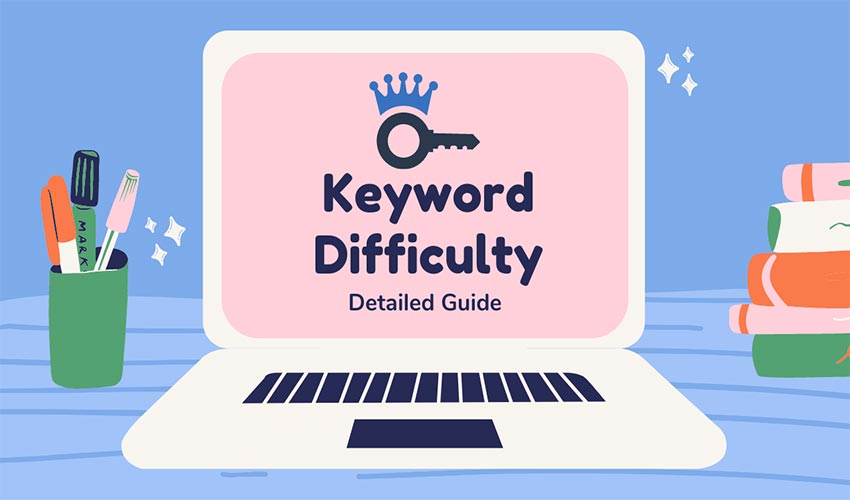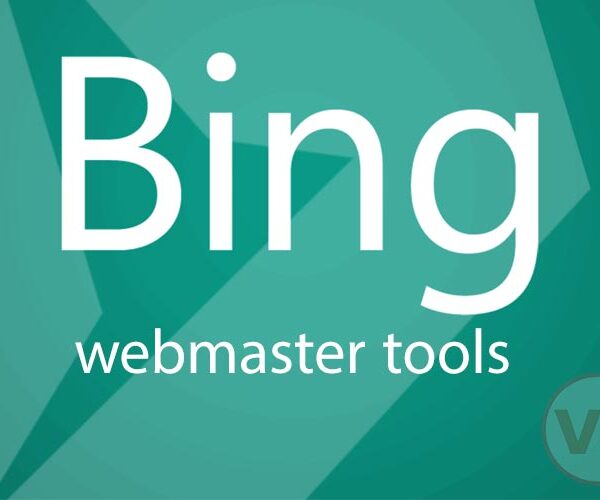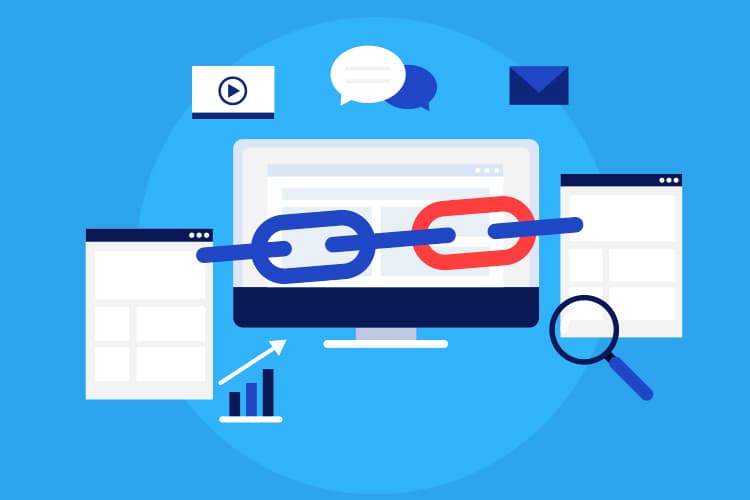In this article, we will discuss what is keyword difficulty, why keyword difficulty is important, and how to measure it using several tools. We will also determine it by using the manual method. So, Grab a cup of coffee and start reading.
What is Keyword Difficulty?
Keyword Difficulty is the process of estimating how difficult it is to rank in Google’s organic search results for a specific term. It is also called “SEO difficulty” or “keyword competition”.
Why Keyword Difficulty is important?
Keyword Difficulty is an important step in the keyword research process. It gives you an overall idea of the difficulty level of a keyword and if there are any chances of your website ranking in the top 10 results.
So, follow the below steps to determine the perfect keyword difficulty using the various tools along with Google.
SEO tools like Ahrefs, SEMrush, Moz, etc will give you different values in keyword difficulty and the range of those metrics is also high.
Then the data of which SEO tool is reliable?
The answer is a little tricky and we have to manually check some criteria for more accurate results.
To know the keyword difficulty comparison I have prepared a graph as shown below. Ahrefs and Kwfinder have low difficulty scores whereas SEMrush and keywordtool.io have high difficulty scores.
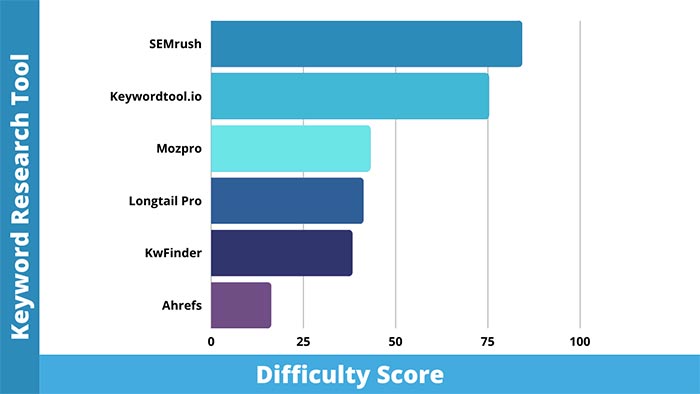
How to determine keyword difficulty manually?
You can’t solely depend on these tools as different tools show different difficulty scores. That’s why you need to find keyword difficulty manually in some cases.
So, Follow the below steps and pick your best keyword.
Step 1:Install Moz bar chrome extension
Install the Moz bar chrome extension and create a free account. It will show you the domain authority and page authority of a website in the search result. It will help you get an overall idea about the top 10 websites ranking on a particular keyword.
It also gives you an overall idea of the backlink profile of the website.
Step 2: Check the Domain authority
Now in the next step keep an eye on domain authority. You will find some high authority websites are ranking in the top positions. But you have to focus on a low authority website and if you found such websites in search results then you can beat that website.
Now you have to check their content and analyze how to better optimize your content to out rank the existing websites.
Step 3: Check the Page Authority
Page authority is another factor to determine keyword difficulty. Page authority is decided by the overall strength and content quality of that page.
Sometimes some high authority websites are ranking higher in search results but their content quality is not that good.
So, If you found such websites in search results then your chances of outrank those websites are higher.
It is said that Google rank pages not websites. So If you are beginners then you should focus on content quality. It will help your website in the longer run.
You can use several SEO tools to measure page authority like Moz, Ahrefs, SEMrush, etc.
Step4: Analyze backlink profile
You should manually analyze the backlink profile as many websites use black hat SEO and unnatural link building tactics to increase their domain authority.
So, If you see lots of backlink coming from these types of websites mentioned below then they will not sustain longer in the organic search result.
- Low-quality web directories
- Article directories
- Blog networks
- Spammy blog comments
- Excessive link exchange
- Buying or selling of links
Step 5: Check Content quality & Onpage SEO
Onpage SEO plays a crucial role in the ranking of pages in the Google SERPs. So, You have to check the top 10 websites On-Page SEO and If you find a website with weak Onpage SEO then you can replace it.
You can evaluate Onpage SEO of a webpage using a chrome extension called “SEO Minion”. It will show you the title, meta description, Number of words used, how h1, h2 tags used etc.
It also gives you the SERPs preview, Broken link, internal and external link information of that page.
Bonus tips:
If you find lots of ads in the search result then this is a high difficulty keyword. In these keywords organic traffic is very low as most of the search traffic goes to paid advertisement. So, working on that keyword is a waste of time.
Let’s understand with an example keyword “best hosting for wordpress”
This is considered a high difficulty keyword as you type in the search result and you will find 4 to 5 ads at the top.
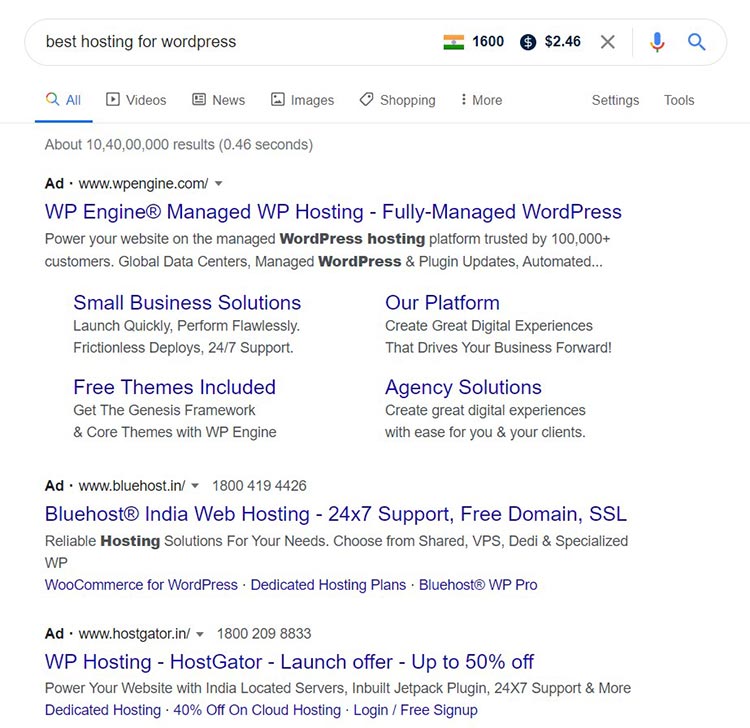
As this is a high profitable niche most of the companies are willing to pay more and more money to bid for the search result. So, even if you managed to get the #1 result, you will not get the most of the traffic.
Instead of targeting those keywords you can target some low keyword difficulty phrases where you will see some of these sites mentioned below ranking in the top 10 position.
It is easy to beat results from quora , pinterest and other forum websites. If you found such a keyword then it will be easy for you to rank in the organic search result.
- Twitter post
- Blogspot
- Facebook group
- Press release sites
- Buzzle
- Yahoo! Answers
- Quora Answers
Conclusion
If you follow these techniques to determine the keyword difficulty then you will get accurate results and ranking on the keywords becomes easy for you.
Just improve the Content quality and try to match the standard of the top 10 results. If you are a beginner then you should follow the top 20 blogging tips that help you become success in the Blogging field.
If you like this guide on keyword Difficulty then do share with your Blogging community and ask your doubt regarding Blogging and keyword research in the comment section. Thank you🙂
About the Author
Rebecca Ellene
Hi, My name is Rebecca! I am a 36-year-old, mom, stay-at-home, and a Blogger. I share info and experience on how to simplify your finances. With my useful tips and easy plans, you too can make and save money from home. My goal is to help you live the big life on a small budget, save money, make money from home and online so you can achieve financial freedom. Join my journey!
View All Articles
